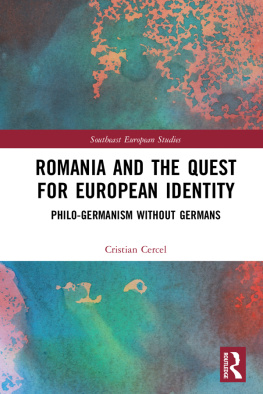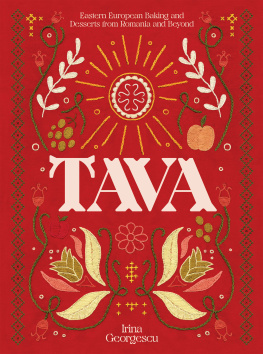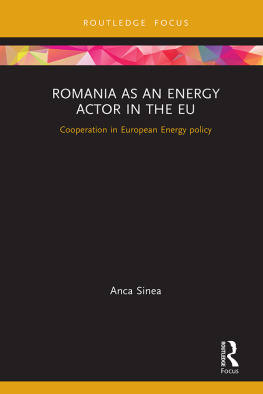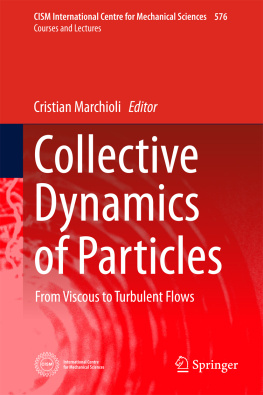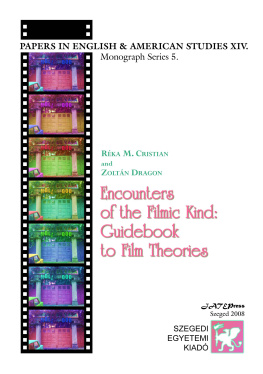Romania and the Quest for European Identity
Exploring the largely positive representations of Romanian Germans predominating in post-1989 Romanian society, this book shows that the underlying reasons for German prestige are strongly connected with Romanias endeavors to become European.
The election, in 2014, of Klaus Iohannis as Romanias president was hailed as evidence that the country chose a European future: that Iohannis belonged to Romanias tiny German minority was also considered to have played a part in his success. Cercel argues that representations of Germans in Romania, descendants of twelfth-century and eighteenth-century colonists, become actually a symbolic resource for asserting but also questioning Romanias European identity. Such representations link Romanias much-desired European belonging with German presence, while German absence is interpreted as a sign of veering away from Europe. Investigating this case of discursive self-colonization and this apparent symbolic embrace of the German Other in Romania, the book offers a critical study of the discourses associated with Romanias postcommunist Europeanization to contribute a better understanding of contemporary West-East relationships in the European context.
This fresh and insightful approach will interest postgraduates and scholars interested in Central, Eastern and Southeastern Europe and in German minorities outside Germany. It should also appeal to scholars of memory studies and those interested in the study of otherness in general.
Cristian Cercel is postdoctoral researcher at the Institute for Social Movements within Ruhr University Bochum. He holds degrees from the University of Bucharest (BA), Central European University (MA) and Durham University (PhD). Before his current appointment, he held research positions and fellowships at New Europe College (Bucharest), Swansea University and the Centre for Advanced Study (Sofia). He has published in refereed academic journals such as Nationalities Papers; East European Politics and Societies and Cultures; Nationalism and Ethnic Politics; and History and Memory.
Southeast European Studies
Series Editor: Florian Bieber
The Balkans are a region of Europe widely associated over the past decades with violence and war. Beyond this violence, the region has experienced rapid change in recent times though, including democratization, economic and social transformation. New scholarship is emerging which seeks to move away from the focus on violence alone to an understanding of the region in a broader context drawing on new empirical research.
The Southeast European Studies Series seeks to provide a forum for this new scholarship. Publishing cutting-edge, original research and contributing to a more profound understanding of Southeastern Europe while focusing on contemporary perspectives the series aims to explain the past and seeks to examine how it shapes the present. Focusing on original empirical research and innovative theoretical perspectives on the region the series includes original monographs and edited collections. It is interdisciplinary in scope, publishing high-level research in political science, history, anthropology, sociology, law and economics and accessible to readers interested in Southeast Europe and beyond.
Changing Youth Values at the European Periphery
Beyond Ethnic Identity
Edited by Tamara P. Trot and Danilo Mandi
Security Community Practices in the Western Balkans
Edited by Sonja Stojanovic and Filip Edjus
Social Movements in the Balkans
Rebellion and Protest from Maribor to Taksim
Edited by Florian Bieber and Dario Brentin
Romania and the Quest for European Identity
Philo-Germanism without Germans
Cristian Cercel
For more information about this series, please visit: www.routledge.com/Southeast-European-Studies/book-series/ASHSER1390
Romania and the Quest for European Identity
Philo-Germanism without Germans
Cristian Cercel
First published 2019
by Routledge
2 Park Square, Milton Park, Abingdon, Oxon OX14 4RN
and by Routledge
52 Vanderbilt Avenue, New York, NY 10017
Routledge is an imprint of the Taylor & Francis Group, an informa business
2019 Cristian Cercel
The right of Cristian Cercel to be identified as author of this work has been asserted by him in accordance with sections 77 and 78 of the Copyright, Designs and Patents Act 1988.
All rights reserved. No part of this book may be reprinted or reproduced or utilised in any form or by any electronic, mechanical, or other means, now known or hereafter invented, including photocopying and recording, or in any information storage or retrieval system, without permission in writing from the publishers.
Trademark notice: Product or corporate names may be trademarks or registered trademarks, and are used only for identification and explanation without intent to infringe.
British Library Cataloguing-in-Publication Data
A catalogue record for this book is available from the British Library
Library of Congress Cataloging-in-Publication Data
Names: Cercel, Cristian, author.
Title: Romania and the quest for European identity : Philo-Germanism without Germans / Cristian Cercel.
Other titles: Philo-Germanism without Germans
Description: Abingdon, Oxon ; New York, NY : Routledge, 2019. |
Series: Southeast European studies | Includes bibliographical references and index.
Identifiers: LCCN 2018054223 | ISBN 9781472465054 (hbk) | ISBN 9781315606873 (ebk)
Subjects: LCSH: GermansRomaniaHistory. | RomaniaEthnic identity. | National characteristics, Romanian. | GermansPublic opinion, Romanian. | RomaniaPublic opinion.
Classification: LCC DR214.G4 C47 2019 | DDC 305.8009498dc23
LC record available at https://lccn.loc.gov/2018054223
ISBN: 978-1-4724-6505-4 (hbk)
ISBN: 978-1-315-60687-3 (ebk)
Typeset in Times New Roman
by Apex CoVantage, LLC
Contents
This book is a revised version of my doctoral thesis, defended in June 2012, at the University of Durham. My primary supervisor, Dr. Ruth Wittlinger, deserves my deepest gratitude for her ongoing intellectual, academic and personal support during my doctoral studies and after their completion. Without her, writing the dissertation would have surely taken much longer. I am also thankful to my second supervisor, Dr. Stephen Welch, for his intellectual assistance. The external readers of the dissertation, Dr. Claire Sutherland and Prof. Karl Cordell, have offered valuable comments as well. The financial support granted by the University of Durham through the Durham Doctoral Fellowship Scheme provided me with the lack of financial constraints needed in order to undertake the research for the dissertation.
In part or as a whole, various drafts of the manuscript first of the doctoral thesis, then of the book have been read by several people, whose feedback was more than welcome and useful. I therefore have to thank Annemarie Weber, Gruia Bdescu, James Koranyi, John Gledhill, Alex Drace-Francis, Natalia Bnulescu-Bogdan, Monica Stroe and Cosmin Cercel for finding the time to read chapter drafts and for offering me their suggestions. I have highly appreciated their input. I am thankful to Hannelore Baier for her indications of primary and secondary sources. Jenny Watson deserves my special gratitude for the effort she put into reading big chunks of the final manuscript on short notice and helping me improve it wherever possible.


